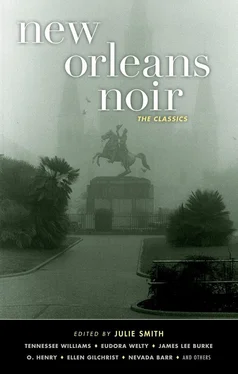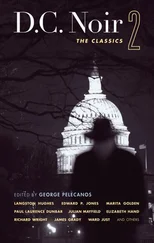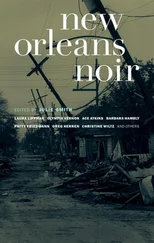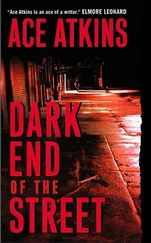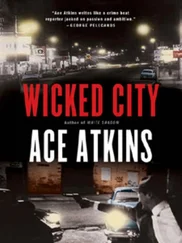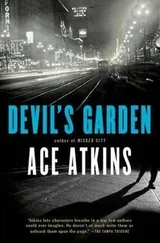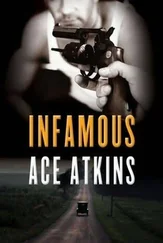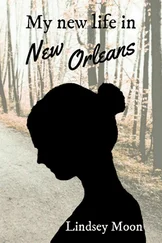Ace Atkins - New Orleans Noir - The Classics
Здесь есть возможность читать онлайн «Ace Atkins - New Orleans Noir - The Classics» весь текст электронной книги совершенно бесплатно (целиком полную версию без сокращений). В некоторых случаях можно слушать аудио, скачать через торрент в формате fb2 и присутствует краткое содержание. Город: New York, Год выпуска: 2016, ISBN: 2016, Издательство: Akashic Books, Жанр: Детектив, на английском языке. Описание произведения, (предисловие) а так же отзывы посетителей доступны на портале библиотеки ЛибКат.
- Название:New Orleans Noir: The Classics
- Автор:
- Издательство:Akashic Books
- Жанр:
- Год:2016
- Город:New York
- ISBN:978-1-61775-384-8
- Рейтинг книги:3 / 5. Голосов: 1
-
Избранное:Добавить в избранное
- Отзывы:
-
Ваша оценка:
- 60
- 1
- 2
- 3
- 4
- 5
New Orleans Noir: The Classics: краткое содержание, описание и аннотация
Предлагаем к чтению аннотацию, описание, краткое содержание или предисловие (зависит от того, что написал сам автор книги «New Orleans Noir: The Classics»). Если вы не нашли необходимую информацию о книге — напишите в комментариях, мы постараемся отыскать её.
takes a literary tour through some of the darkest writing in New Orleans history.
New Orleans Noir: The Classics — читать онлайн бесплатно полную книгу (весь текст) целиком
Ниже представлен текст книги, разбитый по страницам. Система сохранения места последней прочитанной страницы, позволяет с удобством читать онлайн бесплатно книгу «New Orleans Noir: The Classics», без необходимости каждый раз заново искать на чём Вы остановились. Поставьте закладку, и сможете в любой момент перейти на страницу, на которой закончили чтение.
Интервал:
Закладка:
— What else? she asked across the room. I flipped the tape on, and eighteenth-century Venice came at us from four sides. I cut back the volume.
— He said you... hadn’t been man and wife for nine years.
— All right.
I walked back and sat down again. I felt peculiar, neither drunk nor sober, so I poured another one. The first I’d had since they came. — Howard didn’t seem to think so. He said... you wouldn’t let him touch you.
She raised her eyes then. Not angrily, only that same firmness again. — That’s not true, she said, no, whispered, and Bert nodded as though he had been an abiding presence in the marriage chamber for all those nine long years. He could contain himself no more. He fumbled in his coat pocket and handed me a crumpled and folded sheet of paper. It was a notice from American Motors canceling Howard Bedlow’s franchise. Much boilerplate saying he hadn’t delivered and so on. Enclosed find copy of agency contract with relevant revocation clauses underlined. Arrangements will be made for stock on hand, etc.
It was dated 9 May 1966. Bert was watching me. I nodded. — Eight years ago, I said.
— Not ten, Bert was going on. — You see...
— He lost the business... six months after... the... Albert Sidney.
We sat looking at the paper.
— I never denied him, Irma was saying. — After the baby... he couldn’t. At first, we didn’t think of it. What had we done? What had gone wrong? What were we... supposed to do? Was there something we were supposed to do?
— Genes were wrong... hormones, who knows? I said.
Irma smiled at me. Her eyes were black, not brown. — Do you believe that?
— Sure, I said, startled as one must be when he has uttered what passes for a common truth and it is questioned. — What else?
— Nothing, she said. — It’s only...
She and Bert were both staring at me as if I had missed something. Then Irma leaned forward. — Will you go somewhere with me?
I was thinking of the Gulf coast, staring down at the face of my watch. It was almost one thirty. There was a moon and the tide was in, and the moon would be rolling through soft beds of cloud.
— Yes, I said. — Yes I will. Yes.
III
It was early in the morning when we reached Alexandria. The bus trip had been long and strange. We had talked about East Texas where Irma had grown up. Her mother had been from Evangeline Parish, her father a tool-pusher in the Kilgore fields until he lost both hands to a wild length of chain. She had been keeping things together working as a waitress when she met Howard.
On the bus, as if planted there, had been a huge black woman with a little boy whose head was tiny and pointed. It was so distorted that his eyes were pulled almost vertical. He made inarticulate noises and rooted about on the floor of the bus. The other passengers tried to ignore him, but the stench was very bad, and his mother took him to an empty seat in back and changed him several times. Irma helped once. The woman had been loud, aggressive, unfriendly when Irma approached her, but Irma whispered something, and the woman began to cry, her sobs loud and terrible. When they had gotten the child cleaned up, the black woman put her arms around Irma and kissed her.
— I tried hard as I could, miss, but I can’t manage... oh, sweet Jesus knows I wisht I was dead first. But I can’t manage the other four... I got to...
The two of them sat together on the rear seat for a long time, holding hands, talking so softly that I couldn’t hear. Once, the boy crawled up and stopped at my seat. He looked up at me like some invertebrate given the power to be quizzical. I wondered which of us was in hell. He must have been about twelve years old.
In the station, Irma made a phone call while I had coffee. People moved through the twilit terminal, meeting, parting. One elderly woman in a thin print dress thirty years out of date even among country people kissed a young man in an army uniform good-bye. Her lips trembled as he shouldered his dufflebag and moved away. — Stop, she cried out, and then realized that he could not stop, because the dispatcher was calling the Houston bus. — Have you... forgotten anything? The soldier paused, smiled, and shook his head. Then he vanished behind some people trying to gather up clothes which had fallen from a cardboard suitcase with a broken clasp. Somewhere a small child cried as if it had awakened to find itself suddenly, utterly lost.
Irma came back and drank her coffee, and when we walked outside it was daylight in Alexandria, even as on the Gulf coast. An old station wagon with a broken muffler pulled up, and a thin man wearing glasses got out and kissed Irma as if it were a ritual and shook hands with me in that peculiar limp and diffident way of country people meeting someone from the city who might represent threat or advantage.
We drove for twenty minutes or so, and slowed down in front of a small white-frame place on a blacktop road not quite in or out of town. The yard was large and littered with wrecked and cannibalized autos. The metal bones of an old Hudson canted into the rubble of a ’42 Ford convertible. Super deluxe. There was a shed which must have been an enlarged garage. Inside I could see tools, a lathe, work benches. A young man in overalls without a shirt looked out at us and waved casually. He had a piece of drive shaft in his hand. Chickens ambled stupidly in the grassless yard, pecking at oil patches and clumps of rust.
We had eggs and sausage and biscuits and talked quietly. They were not curious about me. They had seen a great deal during the years and there was nothing to be had from curiosity. You come to learn that things have to be taken as they come and it is no use to probe the gestations of tomorrows before they come. There is very little you can do to prepare.
It turned out there had been no quarrel between Irma and her sister’s family. Her sister, plain as Irma was beautiful, who wore thick glasses and walked slowly because of her varicose veins, talked almost without expression, but with some lingering touch of her mother’s French accent. She talked on as if she had saved everything she had seen and come to know, saved it all in exhaustive detail, knowing that someone would one day come for her report.
— It wasn’t never any quarrel, and Howard had got to know better. Oh, we fussed, sure. My daddy always favored Irma and so I used to take after her over anything, you know. Jesus spare me, I guess I hated my own little sister. Till the baby come, and the Lord lifted the scales from my eyes. I dreamed He come down just for me. He looked like Mr. Denver, the station agent down to the L&N depot, and He said, “Elenor, I had enough stuff out of you, you hear? You see Albert Sidney? You satisfied now? Huh? Is that enough for you? You tell me that, ’cause I got to be getting on. I don’t make nobody more beautiful or more smart or anything in this world, but I do sometimes take away their looks or ruin their minds or put blindness on ’em, or send ’em a trouble to break their hearts. Don’t ask why ’cause it’s not for you to know, but that’s what I do. Now what else you want for Irma, huh?”
Tears were flowing down Elenor’s face now, but her expression didn’t change. — So I saw it was my doing, and I begged Him to set it right, told Him to strike me dead and set it right with that helpless baby. But He just shook His head and pushed up His sleeves like He could hear a through-freight coming. “It’s not how it’s done. It ain’t like changing your mind about a hat or a new dress. You see that?”
— Well, I didn’t, but what could I say? I said yes, and He started off and the place where we was began getting kind of fuzzy, then He turned and looked back at me and smiled. “How you know it ain’t all right with Albert Sidney?” He asked. And I saw then that He loved me after all. Then, when I could hardly see Him, I heard Him say, “Anything you forgot, Elly?” but I never said nothing at all, only crossed myself the way Momma used to do.
Читать дальшеИнтервал:
Закладка:
Похожие книги на «New Orleans Noir: The Classics»
Представляем Вашему вниманию похожие книги на «New Orleans Noir: The Classics» списком для выбора. Мы отобрали схожую по названию и смыслу литературу в надежде предоставить читателям больше вариантов отыскать новые, интересные, ещё непрочитанные произведения.
Обсуждение, отзывы о книге «New Orleans Noir: The Classics» и просто собственные мнения читателей. Оставьте ваши комментарии, напишите, что Вы думаете о произведении, его смысле или главных героях. Укажите что конкретно понравилось, а что нет, и почему Вы так считаете.
